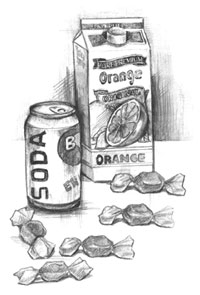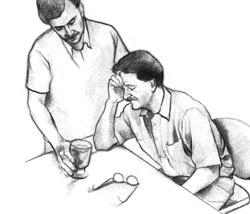 
When Your Blood Glucose Is Too High or Too Low
Chapter 3 of 6
Sometimes, no matter how hard you try to keep your blood glucose in your target range, it’s too high or too low. Blood glucose that’s too high or too low can make you very sick. Here’s how to handle these emergencies.
On this page:
What You Need to Know About Hyperglycemia
If your blood glucose stays over 180, it may be too high. (Go back to the chart that shows target blood glucose ranges.) High blood glucose means you don’t have enough insulin in your body. High blood glucose, or “hyperglycemia,” can happen if you miss taking your diabetes medicine, eat too much, or don’t get enough exercise. Sometimes, the medicines you take for other problems cause high blood glucose. Be sure to tell your doctor about other medicines you take.
Having an infection, being sick, or under stress can also make your blood glucose too high. That’s why it’s very important to check your blood glucose and keep taking your diabetes medicines when you’re sick. (For more about how to take care of yourself when you’re sick, see chapter 5.)
If you're very thirsty and tired, have blurry vision, and have to go to the bathroom often, your blood glucose may be too high. Very high blood glucose may also make you feel sick to your stomach.
If your blood glucose is high much of the time, or if you have symptoms of high blood glucose, call your doctor. You may need a change in your diabetes medicines, or a change in your meal plan.
[Top]
What You Need to Know About Hypoglycemia
Hypoglycemia happens if your blood glucose drops too low. It can come on fast. It’s caused by taking too much diabetes medicine, missing a meal, delaying a meal, exercising more than usual, or drinking alcoholic beverages. Sometimes, medicines you take for other health problems can cause blood glucose to drop.
Hypoglycemia can make you feel weak, confused, irritable, hungry, or tired. You may sweat a lot or get a headache. You may feel shaky. If your blood glucose drops lower, you could pass out or have a seizure.
If you have any of these symptoms, check your blood glucose. If the level is 70 or below, have one of the following right away:
- 3 or 4 glucose tablets
- 1 serving of glucose gel (equal to 15 grams of carbohydrate)
- 1/2 cup (4 ounces) of any fruit juice
- 1 cup (8 ounces) of milk
- 1/2 cup (4 ounces) of a regular (not diet) soft drink
- 5 or 6 pieces of hard candy
- 1 tablespoon of sugar or honey

Have one of these "quick fix" foods when your blood glucose is low.
After 15 minutes, check your blood glucose again to make sure your level is 70 or above. Repeat these steps as needed. Once your blood glucose is stable, if it will be at least an hour before your next meal, have a snack.
If you take diabetes medicines that can cause hypoglycemia, always carry food for emergencies. It’s a good idea also to wear a medical identification bracelet or necklace.
If you take insulin, keep a glucagon kit at home and at a few other places where you go often. Glucagon is given as an injection with a syringe and quickly raises blood glucose. Show your family, friends, and co-workers how to give you a glucagon injection if you pass out because of hypoglycemia.
You can prevent hypoglycemia by eating regular meals, taking your diabetes medicine, and checking your blood glucose often. Checking will tell you whether your glucose level is going down. You can then take steps, like drinking fruit juice, to raise your blood glucose.

When you have hypoglycemia, have a snack to bring your blood glucose back to normal.
ACTION STEPS...
IF YOU USE INSULIN
Tell your doctor if you have hypoglycemia often, especially at the same time of the day or night several times in a row. Tell your doctor if you’ve passed out from hypoglycemia. Ask your doctor about glucagon. Glucagon is a medicine that raises blood glucose. If you pass out from hypoglycemia, someone should call 911 and give you a glucagon shot.
Printer-friendly version of the “Action Steps” if you use insulin
ACTION STEPS...
IF YOU DON’T USE INSULIN
Tell your doctor if you have hypoglycemia often, especially at the same time of the day or night several times in a row. Be sure to tell your doctor about other medicines you are taking. Some diabetes pills can cause hypoglycemia. Ask your doctor whether your pills can cause hypoglycemia.
Printer-friendly version of the “Action Steps” if you DON'T use insulin
[Top]
|




